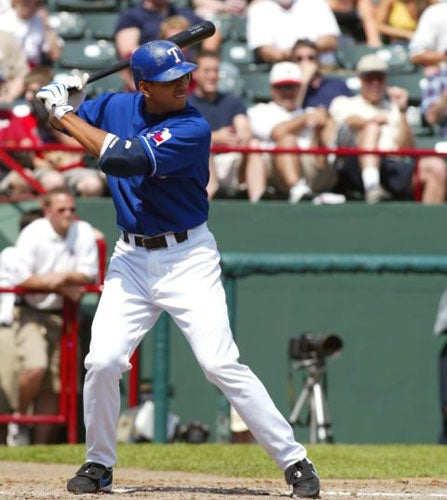Baseball: How A-Rod became A-Fraud
Alex Rodriguez's admission this week that he took drugs has stunned a game sick of scandal, writes Rupert Cornwell

In the Yankees clubhouse the attendants used to call him "A-Fraud". Not in derision of the prodigious talents the baseball gods lavished on Alex Rodriguez, but because of the airs and graces, the endless petty neuroses on display after the slugger commonly judged the finest all-round player of his era arrived in New York from Texas five years ago, under the richest contract in American professional sport.
Today alas, the sobriquet has a deadly new meaning that will forever tarnish Rodriguez' reputation. This week the man the wider baseball world knew more innocently as "A-Rod" confirmed what Sports Illustrated magazine had reported a few days before: that he too had taken performance enhancing drugs, for three years at the Texas Rangers between 2001 and 2003.
In other words, Rodriguez' astonishing statistics – like those of Barry Bonds, Mark McGwire, Sammy Sosa and other tarnished superstars of baseball's steroids era – are, not to put too fine a point on it, a fraud. The only difference now is that the sport's pain, shock and embarrassment are if anything greater still.
The 33-year-old Rodriguez was hitherto the man with no asterisks. A prima donna he might be on occasion. But he was clean. The youngest player ever to hit 500 home runs, A-Rod was baseball's anointed redeemer, who would reclaim the career home runs title, his sport's marquee record, from the soiled and steroid-ridden grip of Bonds.
No more. The 156 homers A-Rod struck during his Texas years will now bear that fatal asterisk, the statisticians mark of Cain, diminishing everything that has come after as well. As with Bonds, McGwire and the rest of them, his entry into baseball's Hall of Fame must now be in doubt. Rodriguez has his consolations, among them a contract worth up to $300m (£206m) over 10 years – which equates in Premier League parlance to the bagatelle of approximately £380,000 a week. Well before it ends, barring injury or a disastrous dip in form, he should have overtaken Bond's total of 762 home runs. But who will really care?
This weekend baseball's annual rite of renewal commences, as major league spring training camps open in Florida and Arizona – a reminder that no winter is eternal and that "The Boys of Summer", as the great baseball writer Roger Kahn once called the vanished Brooklyn Dodgers, will soon be back. In 2009 however the rite threatens, yet again, to be overshadowed by the seemingly never-ending steroids scandal.
On 2 March, just as practice games are starting in earnest, Bonds is due to go on trial for perjury and obstruction of justice, relating to his denial to a grand jury investigating the Balco affair that he had ever used steroids, among them "the cream" and "the clear" that were specialities of Victor Conte's infamous sports nutrition business in San Francisco Bay. Meanwhile, Roger Clemens, to pitching what Bonds was to hitting, is being investigated on similar grounds by the FBI, after Clemens told Congress in Washington that he had never used steroids, despite many reports to the contrary.
Baseball's disgrace, it seemed, could get no worse. But it has. The downfall of Alex Rodriguez has banished any lingering doubts that, in its quest to regain the popularity lost by the devastating 1994-95 players strike, the game sold its soul to steroids. No professional game reveres its statistics like baseball. It is now clear that those relating to the period between 1995 and 2004, when baseball finally introduced compulsory, random drug testing, are not worth the paper they are printed on.
Unlike Bonds, Clemens, McGwire and Sosa, Rodriguez at least has had the sense to own up. "I was stupid, I was naïve," he told television's ESPN channel, blaming the "enormous amount of pressure to perform" he faced after signing his initial $250m (£172m) contract with the Rangers, as well as the "loosey-goosey" nature of an era where everyone was on the juice. Curiously though, a player famous for his obsessive approach to his craft claimed not to know what particular pollutants had entered his system. According to Sports Illustrated, Rodriguez took testosterone and another anabolic steroid, Primobolan.
But confession alone will not make 2009 less of an ordeal for this tarnished child of the Big Apple. The American public as a rule is extraordinarily forgiving of repentant sinners (a certain Bill Clinton comes to mind). But the exacting patrons of Yankee Stadium may be an exception.
For all his feats, A-Rod has never won the heart of New York. The fans might have put up with his philanderings, the messy break-up of his marriage, even the rumours linking him romantically with Madonna, 17 years his senior, had he delivered when it mattered on the field.
Rodriguez has never carried the Yankees to the World Series since he joined them in 2004, let alone to the world championship the franchise used to regard as its birthright. Between 2005 and 2007 he hit a paltry .114 in the post-season. Even in those years they booed him. In 2008 the team didn't even make it to October. For Rodriguez, the dazzling new Yankee Stadium which opens for business in April, may be less showcase than prison cell.
But for baseball, the affair may herald the end of the nightmare. Players, their union and major league management were all complicit in the steroid sham. Now the sport surely has no further to fall. After the downfall of "A-Fraud", no drugs revelation will have the same impact again.
Join our commenting forum
Join thought-provoking conversations, follow other Independent readers and see their replies
Comments